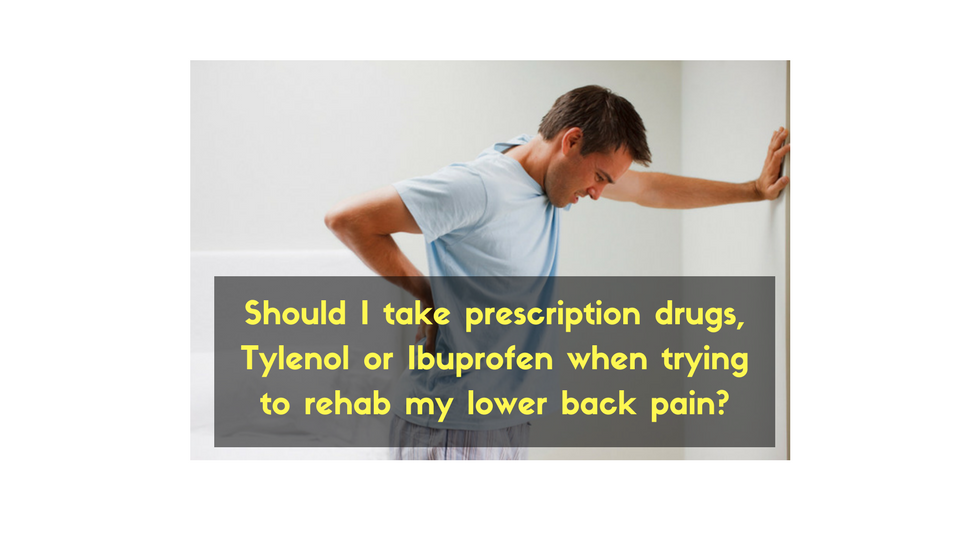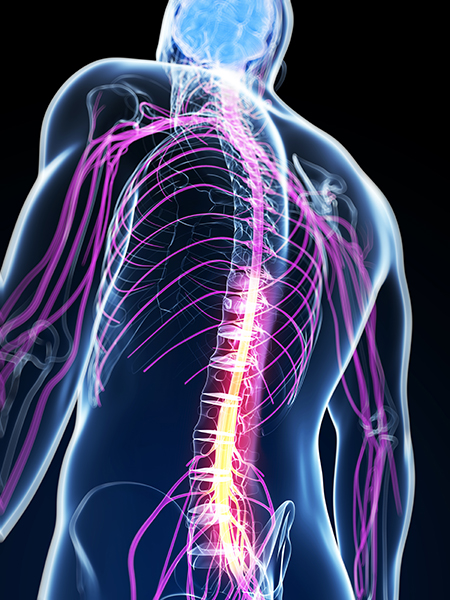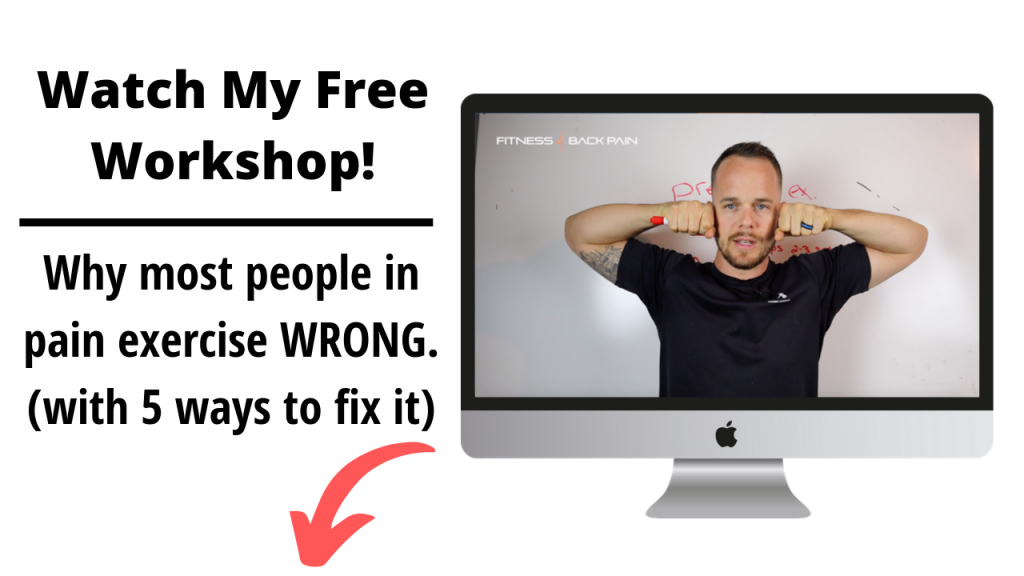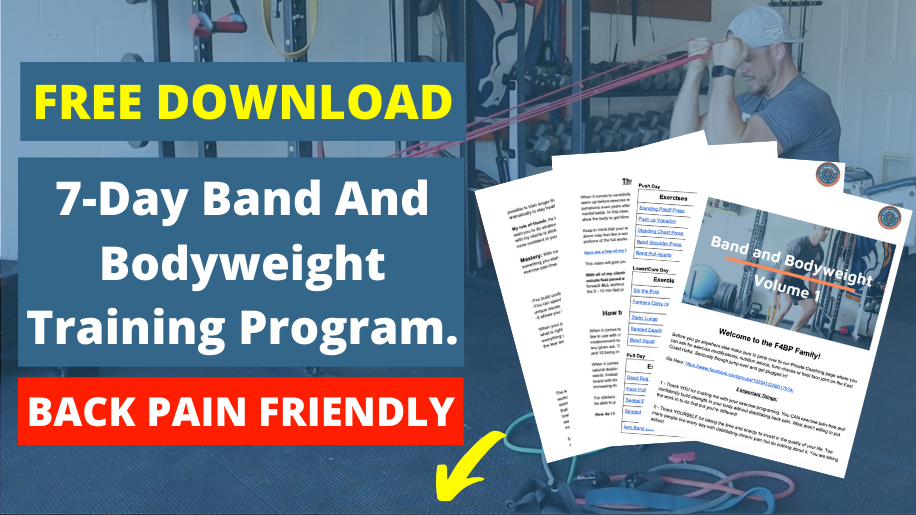
This is a GREAT question I wish more people would ask because it opens the door to really taking control over your rehab. As a back pain sufferer, there is really only one thing you need to think about, beating back pain. You don’t care how or what you have to do, you just want relief.
Today, I want to cover how I approach medication and back pain and how you can make a smart decision with your approach and keep your recovery moving forward.
The common theme that most back pain sufferers see played out in their own lives is what seems like a failed back pain recovery program and birth to the habit of looking for swallow-ables to get them through the day. Before I get on my soapbox I want to make something clear about my own history. There was a time when I was taking 800mg of Ibuprofen mixed with 3-4 Tylenol multiple times a day. I would do this for about a month and stop when I felt like my inflammation and pain would decrease. I would quickly fall back into this cycle after doing something in the gym or throughout the day that would send me around and around on my own pain cycle.
It actually got so bad that my stomach had a small amount of bleeding along with some killer stomach pain from all the pills back to back. I never got on Vicodin or Percocet but I was heading that direction.
My thought at that time was to use the drugs to bring quick relief and thought somehow the medication was actually fixing the “problem” that I couldn’t figure out. I was wrong and all I did was reek havoc on my stomach and intestines to the point where I was forced to stop.
Fast forward 7+ years and I continue to address medication with my students as a preliminary to getting control over your pain.
Below I want to highlight 2 key lessons I learned and continue to bring to light with people like you.
What is the medication doing for you long term?
This is something you have to ask yourself no matter the medication your taking. I understand in some situations the only way you can sleep at night is to take some heavy drugs, I completely understand and would never say to just give it up. We are all on different journeys. The one thing we do have in common is the importance of keeping on-top of what we are taking and WHY. Similar to what I covered when I addressed getting an MRI. You have to always remind yourself that the medication is for short term relief. During this time you have to ruthlessly seek out an approach that involves addressing your own pain cycle and how you’re using your body on a daily basis.
Even when taking medication if you’re taking it primarily for pain relief I suggest cycling it as often as you can. Instead of getting into the habit of taking it first thing in the am or right before bed, you only take it as your body needs it. Again everyone’s level of need for medication is different but it goes without saying the more you become reliant on the medication the harder it’s going to be when trying to wean off.
The key here is to always remember that the medication is a means to an end. Look at it and treat it as a short term relief until you start your recovery or rehab.
Medication hinders your ability to listen to your body.
This is huge.
For me I would do a 45 minute “Yoga for back pain” video then pop the handful of OTC medication I had, go to sleep and wake up feeling like my a lumbar spine was on fire, walking around like it was going to give out at any second.
I was doing it all wrong. Before starting any of my rehab work I would take this same elixir of drugs and be fooled into thinking that the relief I was getting at the end of my workout was from actually addressing my issues. When in reality it was just the drugs kicking in.
This is what I need you to think about.
If you are doing ANY type of rehab program whether it’s something with your trusted physician or rehab specialist you have to lay off the drugs and allow your body to respond to what you’re doing. You don’t want the power of your narcotic to overpower your body telling you to STOP stretching your lower back the way you have been doing it. Learn to listen to your body and trust the way it communicates with you. If doing lower back stretches is causing instability in your lumbar spine and increasing inflammation you don’t want the medication to cover this up.
Working towards getting relief does not have to be tricky. Take small steps and experiment with different corrective techniques to problems you are confident you have. Go into them slowly and see how your body reacts. You should never have to do one day of stretching and a whole week of recovering when it comes to back pain. I know for me this was my reality. I didn’t really know what I needed to do or STOP doing to make my constant inflamed lower back and overactive muscles ease up. If you asked me back then if I was “rehabbing my lower back” I would say yes. In reality, I was simply covering up a constant cycle of re-injury. The only thing that gave me hope was the relief I would get after taking a bunch of NSAID’s. How much sense does that make?

How to manage your pain while weaning off drugs.
Recovery from a back injury or chronic pain situation is just as much neurological as it is mechanical. What I mean by that is the way you move and use your body is key but the way your brain processes pain is just as important. The problem with some is that they get so used to taking medication they don’t really know how to read their own pain. They are just so used to throwing something back at the first sign of discomfort.
I can totally relate to this.
What I have seen the most success with is working on the things that typically get your pain sensors firing first. For me, it was what I did first thing in the am. I would try to bend and lift and sometimes workout right when I woke up and for me, it just was not a good thing. This leads to the habit of taking something first thing. Change your morning habits so that it is no longer a source of pain but a source of pain-free, un-irritated movement. This will push back the need for the medication as well as eventually break the habit of needing something first thing.
Repeat that every day and continue to adjust your life so that you become more aware of your pain triggers and start correcting them before they cause pain. By cutting back on medication you are slowly teaching your brain how to manage and process pain. I use pain to adjust my habits throughout the day. If I have been standing too long I don’t just pop something when the symptoms come on, I make adjustments and allow my body to rest and the symptoms will go away.
Rehabbing your lower back issue is a constant dance. You take 3 steps forward and 2 steps back. Relief comes as you learn more and more about yourself. It’s not about the number of stretches or exercises you do but the environment you create in your body for it to heal without constant irritation.
Question for you, and be honest.
Do you take medication because of the fear of pain or because you were told it’s your only option for relief?
Let me know below!
Your back pain coach,
William


I was a horseshoer for 5 years and had to stop due to back pain.
Over the years, my pain level and emotions have been a roller coaster.
I just wanted to throw in that you can MAXIMIZE or MINIMIZE your pain in your mind. The more you feed the feeling of self pity and feel entitled to be free of all pain – you increase your pain level.
When you relax and accept the fact that you won’t be 100% and start looking at what you do have, the pain minimizes.
Sitting for 5 minutes and taking a break from everything and focusing on the blessings you have been given (including your very life of which you did nothing to earn or deserve) will be like a powerful pain reliever.
We should take advantage of physical therapy and be wise with our bodies. We must also be wise with our emotions and spirits.
We are often weighed down by unrealistic expectations of our bodies. Who are we to judge where the bar is set for our bodies? We can work with all our might but we must accept that there are limitations. I for one will choose to be more balanced in my expectations and not allow discouragement and self-pity to win.
There is a power that transcends pain (is a comfort in it’s midst) and has the ability to transform a life.
The knowledge of God is real and powerful. He is a very real comfort to those in pain.
Amen! Love this point of view! There is power in his name as well in the words we speak. The mind is a massive tool and the more we can balance a clear and positive way of thinking the more chances we can give our bodies to relax and bring healing. Thanks for your comment brother!